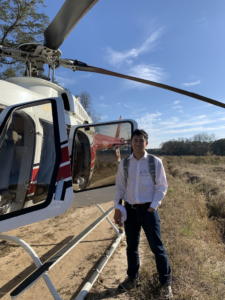October 18, 2023
My year as an AGU Congressional Science Fellow
Posted by Caitlin Bergstrom
My year as an AGU Congressional Science Fellow
By Nathan Dadap
This past year, I worked for Senator Jon Ossoff (GA) as an AGU Congressional Science Fellow, focusing on energy, environment, and agriculture issues. I had an amazing experience and strongly encourage anyone interested in policy and government to apply for the fellowship. Here are some personal reflections from the experience.
What is a Congressional Science Fellowship?
The Congressional Science Fellowship program places highly qualified and accomplished scientists, engineers, and other professionals in the office of an individual member of Congress or on a committee for a one-year assignment.
The program allows our federal government to more effectively use scientific knowledge and provides scientists with the opportunity to make significant contributions to public policy during their time on Capitol Hill. AGU, along with many other scientific societies, host a fellow each year.
Why did I apply?
Many of the roadblocks hindering environmental progress are socioeconomic in scope and would entail institutional reforms. These are issues that lie in the sphere of policymaking.
What better place to learn about policy than in Congress?! Although I had doubts about whether I would be a competitive candidate for the fellowship, I figured this was a unique opportunity that I had to apply to.
How do fellows get placed in offices?
Fellows can work in any congressional office, whether that be in a personal office or committees of either party in the House or Senate. Many offices are familiar with the program and fellows are in demand.
After an orientation, fellows interview with offices then decide where they want to work. Fit between the fellow and office is affected by various factors such as the topics that a fellow would work on, the political values and approach of the congressperson, and office culture.
What did I work on?
The main responsibility of a legislative staffer is to help the member identify problems and find appropriate ways to address them. If a member decides to engage on an issue, they have a number of tools at their disposal. For example, they can write legislation, cosign bills and letters, or bring attention to the issue by convening stakeholders and meeting with key decisionmakers.
As a staffer, you are often doing the legwork of this process – researching issues in depth, reading the news, meeting with constituents and stakeholders, evaluating options, drafting letters and legislation, and ultimately, making recommendations to the member.
Did I use science in my role as a fellow?
To my surprise, when I told Senator Ossoff that I studied peat swamp hydrology in grad school, he not only knew what “peat” was, but he immediately directed me to look into issues facing a peat swamp in Georgia.
Although a high level of specialized knowledge is not usually necessary for evaluating policy options, in this case it was certainly helpful as I reviewed other scientists’ findings and translated its implications. This is an invaluable skill that science fellows bring to Congress.
Can anything get done amidst a polarized political climate?
Although political dysfunction grabs all the headlines, congress still faithfully passes large pieces of legislation each year such as the Appropriations bills (which regulate expenses by the federal government) and the National Defense Authorization Act. These large bills provide a vehicle for smaller pieces of legislation to pass, as provisions can be written into the larger bill text.
This year, I had a fantastic opportunity to work on one such “must-pass” piece of legislation – the Farm Bill. This multi-year law governs food and agricultural programs, and I worked to develop a bill (S.1743, the Forest Data Modernization Act) that got bipartisan support in both the Senate and the House. Fingers-crossed that this gets included in the final version of the Farm Bill!
You can learn more about AGU’s Congressional Science Program on their website, and apply to be a fellow yourself. Applications for the 2024-2025 cohort are open now until 15 January 2024.



